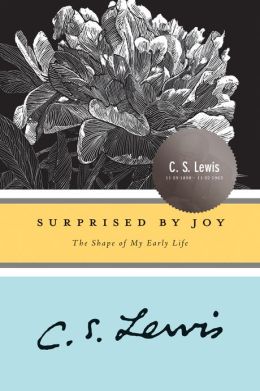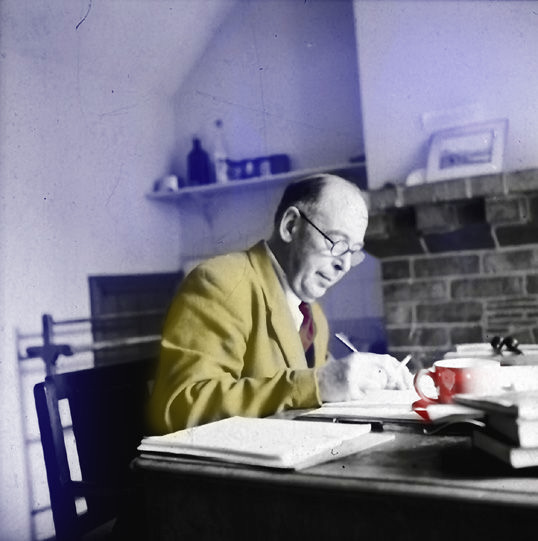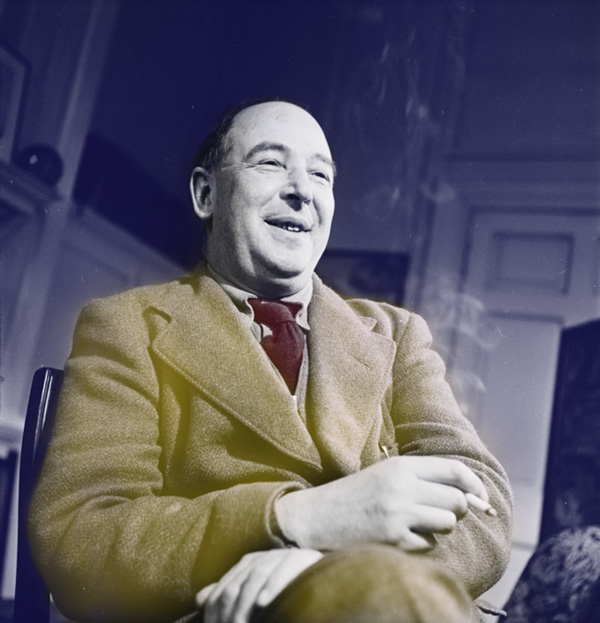by Maria Popova
“It is essential of the happy life that a man would have almost no mail.”
 I’ve had a longtime fascination with the daily routines of notable writers and their creative rituals. One of the most lyrical, opinionated, and altogether wonderful comes from C.S. Lewis — a man of great wisdom on writing and extraordinary capacity for nuance in existential matters. In his 1955 spiritual memoir,Surprised by Joy: The Shape of My Early Life(public library), Lewis outlines his ideal daily routine, modeled after his time studying privately at Great Bookham with his father’s old tutor at the age of fifteen:
I’ve had a longtime fascination with the daily routines of notable writers and their creative rituals. One of the most lyrical, opinionated, and altogether wonderful comes from C.S. Lewis — a man of great wisdom on writing and extraordinary capacity for nuance in existential matters. In his 1955 spiritual memoir,Surprised by Joy: The Shape of My Early Life(public library), Lewis outlines his ideal daily routine, modeled after his time studying privately at Great Bookham with his father’s old tutor at the age of fifteen:[I] settled into a routine which has ever since served in my mind as an archetype, so that what I still mean when I speak of a “normal” day (and lament that normal days are so rare) is a day of the Bookham pattern. For if I could please myself I would always live as I lived there. I would choose always to breakfast at exactly eight and to be at my desk by nine, there to read or write till one. If a cup of good tea or coffee could be brought me about eleven, so much the better. A step or so out of doors for a pint of beer would not do quite so well; for a man does not want to drink alone and if you meet a friend in the taproom the break is likely to be extended beyond its ten minutes. At one precisely lunch should be on the table…
Like artist Maira Kalman, who has long advocated for walking as a creative catalyst, Lewis was an avid walker — but with a key disclaimer:
By two at the latest I would be on the road. Not, except at rare intervals, with a friend. Walking and talking are two very great pleasures, but it is a mistake to combine them. Our own noise blots out the sounds and silences of the outdoor world; and talking leads almost inevitably to smoking, and then farewell to nature as far as one of our senses is concerned. The only friend to walk with is one … who so exactly shares your taste for each mood of the countryside that a glance, a halt, or at most a nudge, is enough to assure us that the pleasure is shared.
(Of course, walking with the right kind of companion can only amplify our capacity to pay attention, rather than diminishing it.)
Lewis holds equally strong opinions about his tea. One can almost picture him demanding a strict adherence to George Orwell’s eleven golden rules for the perfect cup of tea as he describes the afternoon ritual:
The return from the walk, and the arrival of tea, should be exactly coincident, and not later than a quarter past four. Tea should be taken in solitude…
He goes on to outline the qualitative norms for permissible multitasking during mealtime, with some humbling criteria for what he considers light — “gossipy, formless” — reading:
Eating and reading are two pleasures that combine admirably. Of course not all books are suitable for mealtime reading. It would be a kind of blasphemy to read poetry at table. What one wants is a gossipy, formless book which can be opened anywhere. The ones I learned so to use at Bookham were Boswell, and a translation of Herodotus, and Lang’s History of English Literature. Tristram Shandy, Elia and The Anatomy of Melancholy are all good for the same purpose.
And then, it’s back to work until bedtime, the latter being a matter of strict discipline — because, lest we forget, the correlation between sleep and literary productivity is not to be dismissed:
At five a man should be at work again, and at it till seven. Then, at the evening meal and after, comes the time for talk, or, failing that, for lighter reading; and unless you are making a night of it with your cronies (and at Bookham I had none) there is no reason why you should ever be in bed later than eleven.
But Lewis’s most prescient money-quote — the one likely to elicit a bitter cackle from today’s inbox-weary writer — comes at the very end:
But when is a man to write his letters? You forget that I am describing the happy life I led with Kirk or the ideal life I would live now if I could. And it is essential of the happy life that a man would have almost no mail and never dread the postman’s knock.
Complement with Lewis on how to write with authenticity and what free will really means, then revisit the daily routines of Charles Darwin, William S. Burroughs, Charles Bukowski, John Updike, Joy Williams, Kurt Vonnegut,Herman Melville, Henry Miller, Mark Twain, Gertrude Stein, Vladimir Nabokov, James Joyce, and other literary titans.


No comments:
Post a Comment